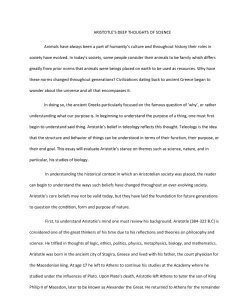ARISTOTLE’S DEEP THOUGHTS OF SCIENCE Animals have always been a part of humanity’s culture and throughout history their roles in society have evolved. In today’s society, some people consider their an
ARISTOTLE’S DEEP THOUGHTS OF SCIENCE Animals have always been a part of humanity’s culture and throughout history their roles in society have evolved. In today’s society, some people consider their an
ARISTOTLE’S DEEP THOUGHTS OF SCIENCE
Animals have always been a part of humanity’s culture and throughout history their roles in society have evolved. In today’s society, some people consider their animals to be family which differs greatly from prior norms that animals were beings placed on earth to be used as resources. Why have these norms changed throughout generations? Civilizations dating back to ancient Greece began to wonder about the universe and all that encompasses it.
In doing so, the ancient Greeks particularly focused on the famous question of ‘why’, or rather understanding what our purpose is. In beginning to understand the purpose of a thing, one must first begin to understand said thing. Aristotle’s belief in teleology reflects this thought. Teleology is the idea that the structure and behavior of things can be understood in terms of their function, their purpose, or their end goal. This essay will evaluate Aristotle’s stance on themes such as science, nature, and in particular, his studies of biology.
In understanding the historical context in which an Aristotelian society was placed, the reader can begin to understand the ways such beliefs have changed throughout an ever-evolving society. Aristotle’s core beliefs may not be valid today, but they have laid the foundation for future generations to question the condition, form and purpose of nature.
